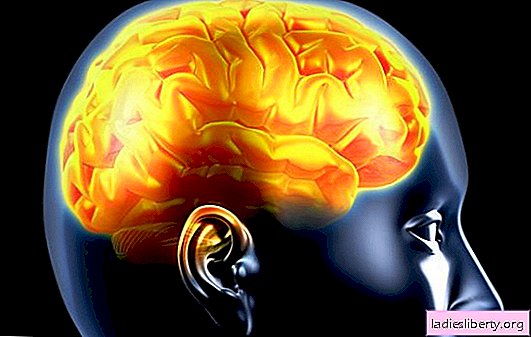
Inflammation of the human brain is a rather serious and complex pathology, which in the absence of timely treatment can lead to death of the patient.
Depending on the specific affected area, this condition can be of several varieties.
Consider in more detail the symptoms of inflammation of the cerebral cortex and the main methods of treating such an ailment.
Inflammation of the brain: causes
Inflammation of the brain can occur for the following reasons:
1. Meningitis is a disease in which the lining of the brain becomes inflamed. Various viruses, bacterial lesions (salmonella, staphylococcus, etc.), severe hypothermia, or fungi can provoke its development.
According to its classification, meningitis can be serous or purulent.
In the form of the course, the pathology is acute, subacute and chronic.
In addition to the main reasons, the following diseases can cause acute meningitis:
• sinusitis, frontal sinusitis or sinusitis;
• severe pneumonia;
• conjunctivitis;
• abscess (may be in different locations);
• furunculosis;
• chicken pox (usually chickenpox leads to meningitis in adults, since it is more severe);
• mumps.
2. Encephalitis It is a very serious pathology, in which the patient's brain substance becomes inflamed. Based on statistics, encephalitis is characterized by a difficult course and high mortality rates.
Most often, this disease affects children (more than 75% of all cases).
Encephalitis can be primary and secondary. In the first case, severe viral lesions (flu, mosquito and tick bite, herpes) can cause it.
Secondary encephalitis can occur due to complications from the following diseases:
• rubella;
• smallpox;
• defeat of toxoplasmosis;
• malaria;
• the development of complications after the introduction of the vaccine;
• measles.
Inflammation of the cerebral cortex: symptoms and signs
Depending on the type and type of the disease, inflammation of the brain may have the following symptoms:
1. Meningitis is accompanied by such manifestations:
• rapid increase in body temperature;
• trembling;
• increase in blood pressure;
• the appearance of a gray shade of the skin;
• feeling of anxiety;
• fear of bright light;
• intolerance to pungent odors;
• a very severe headache, which is localized in the area of the temples and forehead;
• constantly recurring vomiting and nausea;
• intolerance to tactile touch;
• deterioration of muscle tone;
• severe weakness;
• excessive sweating;
• increased heart rate.
With the rapid development of the disease, the above symptoms can develop within a day. Next comes the swelling of the brain. In this condition, the patient may suffer from confusion, convulsions and convulsions.
2. Encephalitis is usually accompanied by such manifestations:
• fever;
• anxiety;
• sleep disturbance;
• joint pain;
• vomiting;
• very severe headaches;
• swelling of the airways;
• high body temperature;
• hallucinations and other mental disorders;
• hyperemia;
• cough;
• coma;
• cramps;
• confusion;
• deterioration in overall health;
• the appearance of small bruises throughout the body;
• diarrhea;
• heart rhythm disturbance.
Treatments for inflammation of the lining of the brain
When the first signs of inflammation of the brain appear, you must immediately call an ambulance. In this condition, the person is sent to the intensive care unit of the hospital.
The following procedures will help to confirm the diagnosis:
1. Blood and urine tests.
2. MRI.
3. CT.
4. The study of cerebral fluid will provide an opportunity to study the degree of the disease, to identify its form and cause.
The treatment of such inflammation is always selected for each patient individually, depending on the type of pathology, its cause and course.
Traditional therapy involves the following:
1. In case of brain damage by bacteria, potent antibiotics are prescribed. It is necessary to prick them within ten days. Types of antibiotics are selected depending on the causative agent of the disease.
2. In case of infection with viruses, treatment is carried out on the basis of symptoms (headaches, diarrhea and other symptoms are eliminated).
3. Diuretic drugs are used to relieve cerebral edema.
4. To reduce intoxication, Albumin or an isotonic solution can be used.
5. Glucocorticosteroids are used to prevent the progression of edema.
6. If the disease was caused by fungi, then antibiotics in this case will be ineffective. In this condition, the patient needs to be prescribed antimycotic drugs.
7. Antiviral medications are prescribed for fast viruses. Typically, Cytosine arabinosis is used for this purpose.
8. Gammaglobulin is a central and mandatory drug for inflammation of the brain. It has a pronounced therapeutic effect and should be administered intravenously for three days.
9. When observing seizures or epileptic seizures, anticonvulsants are used.
10. At high temperature and fever, antipyretic drugs are prescribed.
It is important to know, that meningitis and encephalitis are those categories of diseases that require close monitoring during treatment and a reasonable selection of drugs. For this reason, self-medication in the diagnosis of such pathologies is strictly contraindicated.
Features of the treatment of inflammation of the lining of the brain
In addition to traditional drug therapy, the following procedures can be prescribed for a patient with inflammation of the brain:
1. Mud treatment or mud treatment. This procedure is aimed at stimulating the nervous system, producing hormones, enhancing carbohydrate metabolism and restoring lipoid metabolism.
The duration of the procedure should be twenty minutes. The course of treatment includes twelve sessions.
2. Thalassotherapy or bathing with the addition of useful chemicals (iodine, calcium, potassium, etc.). These trace elements will penetrate the skin through the sweat glands, and enter the bloodstream. Thanks to this procedure, it is possible to improve microcirculation in the tissues, restore brain dynamics and relieve inflammation.
The course of such treatment includes twenty sessions.
3. Treatment with mineral waters with trace elements (fluorine, copper, zinc). Such therapy will help improve metabolism in the body and reduce inflammation. The course of treatment provides for four weeks. You need to drink mineral water every morning on an empty stomach.
4. Medicinal electrophoresis is used to enhance the work of the cerebral cortex and activate the processes of homeostasis. The duration of the course is 15 procedures of twenty minutes.
In the absence of timely treatment therapy, the patient may develop the following complications:
1. Paralysis.
2. Visual impairment.
3. Strabismus.
4. Impaired memory and hearing.
5. The appearance of epileptic seizures.
6. The development of acute or chronic renal and liver failure.
7. Violation of motor functions.
8. Deterioration of the heart.
The main complication of meningitis is considered fatal. It occurs if the patient is not treated for 5-8 days after the onset of the disease.
It is impossible to completely prevent brain inflammation, but you can reduce the risk of its development. To do this, you should adhere to the following doctor's recommendations:
1. Refuse bad habits (smoking, drinking).
2. In time to treat those diseases that can cause complications in the form of inflammation of the brain.
3. To vaccinate against mumps, chickenpox and other diseases.
4. Avoid being in places where there are outbreaks of viral encephalitis.
5. Protect yourself from mosquito bites and ticks. To do this, while in nature, it is important to wear tight pants and outerwear. A hat must also be worn on the head.
In addition, to make it easier to notice ticks, clothing should be light.
6. After returning from the forest or clearings, you need to carefully examine your clothes, and the children who were with you. It is advisable to grind and wash well.
Also do not forget about pets. Dangerous insects - carriers of the disease can also hide on their wool.











